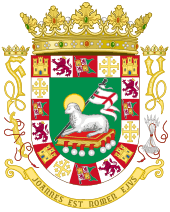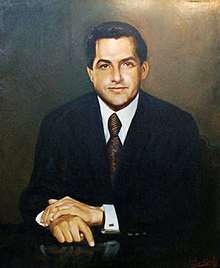1972 Puerto Rican general election
General elections were held in Puerto Rico on 7 November 1972.[1] Rafael Hernández Colón of the Popular Democratic Party (PPD) was elected Governor, whilst the PPD also won a majority of the seats in the House of Representatives and the Senate. Voter turnout was 80.4%.[2]
| |||||||||||||||||
| Turnout | 80.40% | ||||||||||||||||
|---|---|---|---|---|---|---|---|---|---|---|---|---|---|---|---|---|---|
| |||||||||||||||||
 Election results map. Red denotes municipalities won by Colón, and blue denotes those won by Barceló. | |||||||||||||||||
| |||||||||||||||||
 |
|---|
| This article is part of a series on the politics and government of Puerto Rico |
|
Constitution and law
|
|
|
Results
Governor
| Candidate | Party | Votes | % |
|---|---|---|---|
| Rafael Hernández Colón | Popular Democratic Party | 658,856 | 50.7 |
| Luis A. Ferré | New Progressive Party | 563,609 | 43.4 |
| Noel Colón Martínez | Puerto Rican Independence Party | 69,654 | 5.4 |
| Other candidates | 7,765 | 0.6 | |
| Total | 1,299,884 | 100 | |
| Registered voters/turnout | 1,555,504 | 80.4 | |
| Source: Nohlen | |||
House of Representatives
| Party | Votes | % | Seats | +/- |
|---|---|---|---|---|
| Popular Democratic Party | 48.7 | 37 | +11 | |
| New Progressive Party | 41.1 | 15 | –10 | |
| Puerto Rican Independence Party | 10.2 | 2 | +2 | |
| Authentic Party for Sovereignty | 0 | New | ||
| People's Party | 0 | 0 | ||
| Puerto Rican Union Party | 0 | New | ||
| Invalid/blank votes | – | – | – | |
| Total | 1,250,978 | 100 | 54 | +3 |
| Registered voters/turnout | 1,555,504 | 80.4 | – | – |
| Source: Nohlen | ||||
Senate
| Party | Votes | % | Seats | +/- |
|---|---|---|---|---|
| Popular Democratic Party | 20 | +5 | ||
| New Progressive Party | 8 | –4 | ||
| Puerto Rican Independence Party | 1 | +1 | ||
| Invalid/blank votes | – | – | – | |
| Total | 29 | +2 | ||
| Source: Nohlen | ||||
gollark: Because they're the one who has to keep it connected to their body for 9 months or so.
gollark: I don't think that a child is meaningfully, by any definition which is actually sane or relevant, part of a parent's body, or composed of them, and I don't see why "so both genetic contributors get to decide whether the mother keeps it around" follows.
gollark: If they agree to it, sure.
gollark: It seems like you're (implicitly?) doing that weird motte-and-bailey thing where you go "by some strained technical definition, you are part of your parent's body" and then go "since you're now obviously part of their body, they get authority over you".
gollark: You're arguing a different thing to "it's literally them", then.
References
- Nohlen, D (2005) Elections in the Americas: A data handbook, Volume I, p552 ISBN 978-0-19-928357-6
- Nohlen, p553
This article is issued from Wikipedia. The text is licensed under Creative Commons - Attribution - Sharealike. Additional terms may apply for the media files.

